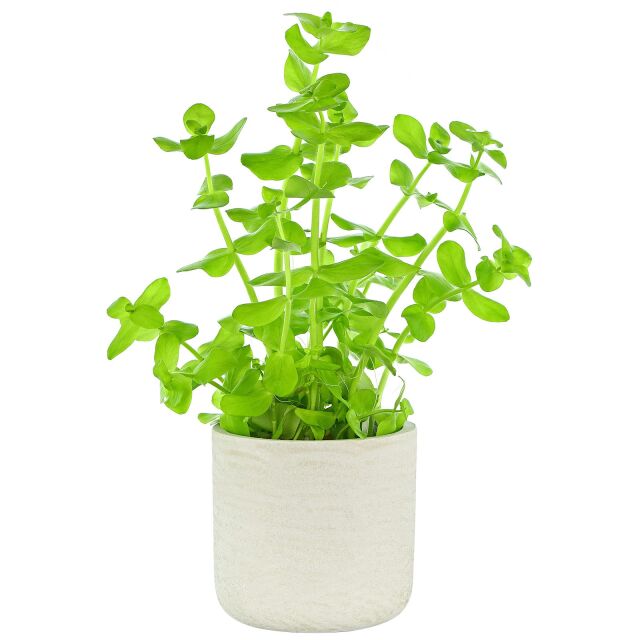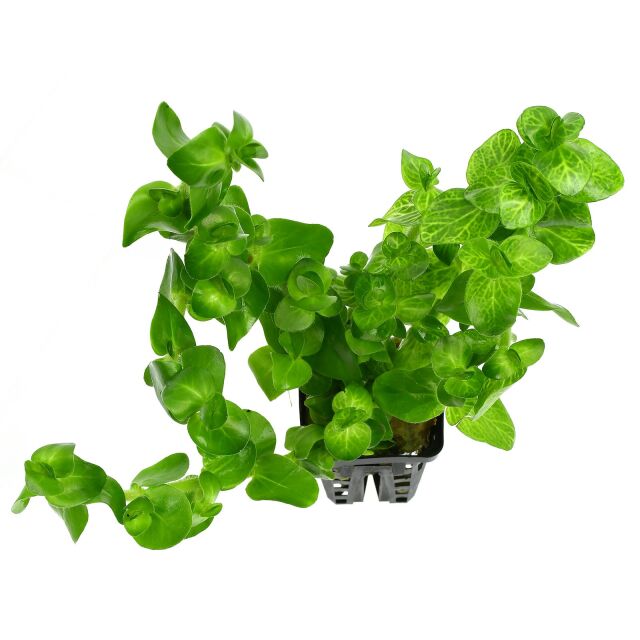Variegated Bacopa




Bacopa lanigera
Variegated Bacopa
- Roundish ovate leaves
- Blue-violet flowers in the terrestrial form
- Especially recommendable for paludariums
Item question
We’re here for you!
Please enter your question and e-mail and we’ll contact you as soon as possible. It usually takes us up to 24 hours during business days to respond.
Thank you for your question!
Thank you, we’ll get in touch!
Close window
You already sent us a question.
Please wait a few minutes
Description
The Variegated Bacopa is a large Water hyssop species native to Brazil. In nature, it colonises wet soil and shallow water. Bacopa lanigera can grow above and below water and, particularly in its emersed form, is similar to the Lemon Bacopa (B. caroliniana), but the 1.5 to 3 cm long emersed leaves are rounder and have more conspicuous, dense and white hairs on the stem. The leaf veins are often whitish and form a light-coloured net pattern. This is why the plant is also known as Bacopa lanigera 'Variegata', although this leaf pattern is often not present. In the terrestrial form, the more or less prostrate shoots form pretty, deep blue-violet flowers in the leaf axils. Crushed leaves have a strong aromatic odour.
In the underwater form, the shoots, which are at least 35 cm long, grow loosely upright, sloping to arching. They are about 5 to 8 cm wide. The very light green stems are about 3.5 to 4.5 cm thick and rather soft. They can be glabrous or hairy. The light green, soft, irregularly wavy leaves are up to 4 cm long and 2.6 cm wide. The submerged plant is somewhat reminiscent of Bacopa australis, but is much larger in all parts.
Bacopa lanigera is sometimes described as unsuitable or not very suitable for aquaria. However, this does not correspond to our experience, even though this Water hyssop species has significantly higher cultivation requirements than Bacopa caroliniana, for example. At least with strong lighting, additional CO2, low carbonate hardness and an abundant supply of macro and micronutrients via the water column or the substrate, the plant grows relatively quickly submersed and forms a lush bush with large, soft, light green leaves. Temperatures above 20 °C are recommended. As with other stem plants, it is propagated by terminal and partial cuttings. Occasional pruning encourages branching of the shoots, which often grow at an angle or in an arch. The plant looks best if it is not allowed to grow much taller than 30 cm.
In its emersed form, the woolly butterwort grows well in plenty of light and in a nutrient-rich substrate. The prostrate shoots root at the nodes.
Bacopa lanigera with its loosely upright growth, thick stems and rather large, broadly ovate, light green leaves is a striking appearance in the aquarium, ideally as a group in the midground. It is also particularly recommended as a creeping plant in well-lit paludariums, where its light green foliage and blue-violet flowers make it a pretty sight.
Bacopa lanigera is a Bacopa species from Brazil that looks a lot like B. caroliniana. Its emersed form has a densely hirsute stem, which is also expressed by the species name (lanigera = "carrying wool"). There is contradicting information about its suitability for aquaria.
- To be continued -
| Complete botanical name | Bacópa lanígera (Cham. & Schltdl.) Wettst. |
| Family | Plantaginaceae |
| Genus | Bacopa |
| Difficulty | medium |
| Usage | Background, Midground |
| Growth | medium |
| pH value | 5 - 7 |
| Temperature tolerance | 20 - 30°C |
| Carbonate hardness | 0 - 7°dKH |
| General hardness | 0 - 30°dGH |
| Propagation | Cuttings |
| Can grow emersed? | yes |
| Source | Flowgrow |
| Complete botanical name |
| Bacópa lanígera (Cham. & Schltdl.) Wettst. |
| Family |
| Plantaginaceae |
| Genus |
| Bacopa |
| Difficulty |
| medium |
| Usage |
| Background, Midground |
| Growth |
| medium |
| pH value |
| 5 - 7 |
| Temperature tolerance |
| 20 - 30°C |
| Carbonate hardness |
| 0 - 7°dKH |
| General hardness |
| 0 - 30°dGH |
| Propagation |
| Cuttings |
| Can grow emersed? |
| yes |
| Source |
| Flowgrow |
General information
| Item no. |
|
| EAN | |
| Weight | 0,10 kg |
| Shipping weight | 0,10 kg |
Customers ask customers
You have questions about this product? Ask other customer or our support team about this product!